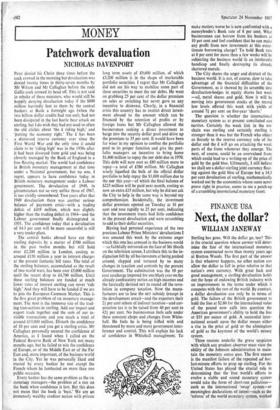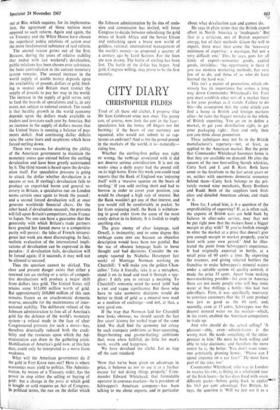Next, the dollar?
FINANCE USA WILLIAM JANEWAY
Sterling has gone. Will the dollar go, too? This is the crucial question whose answer will deter- mine the fate of the international monetary system constructed more than twenty years ago at Bretton Woods. The first part of the answer is that whatever happens, no other nation can allow the dollar to fall in price relative to that nation's own currency. With great luck and good management, a sterling devaluation holds out the Dope of endowing British industry with an improvement in the terms under which it competes with the rest of the world. By contrast, a dollar devaluation can only be in terms of gold. The failure of the British government to hold the line at $2.80 for the international value of the pound now calls into question the American government's ability to hold the line at $35 per ounce of gold. A successful inter- national assault upon the dollar means either a rise in the price of gold or the elimination of gold as the keystone of the world's money system.
Three reasons underlie the grave suspicion with which any prudent observer must view the ability of the Johnson administration to main- tain the monetary status quo. The first reason is the manifest failure of the repeated ad hoc, last-minute efforts to prop up sterling. For the United States has played the crucial role in determining that the free world's efforts to evolve a stable and sound monetary system would take the form of short-run palliatives— such as the international `swap' system—or meaningless declarations of intent—such as the `reform' of the world monetary system, worked out at Rio, which requires, for its implementa- tion, the agreement of those nations most opposed to such reform. Again and again, the us Treasury and the White House have chosen the superficial public relations of action over the more fundamental substance of real reform.
The second reason grows out of the first. Because, during the years of relative stability that ended with last weekend's devaluation, public relations has been chosen over substance, the basic contradiction in the current monetary system remains. The annual increase in the world supply of usable money depends upon the availability of pounds, dollars or gold. Sterl- ing is suspect and Britain must restrict the supply of pounds to pay her way in the world. The increase in the supply of gold serves only to feed the hoards of. speculators and is, in any event, not subject to rational control. The result is that healthy growth in the world economy depends upon the dollars made available to traders and investors each year by America. But an increase in the supply of dollars means that the United States is running a balance of pay- ments deficit. And continuing dollar deficits raise the same fears and suspicions which have forced sterling down.
These two reasons for doubting the ability of the American government to maintain the monetary status quo existed before the sterling devaluation and have been greatly accentuated by it. The third reason is based upon the devalu- ation itself. For speculative pressure is going to attack the dollar whether devaluation is a success or not. If sterling's devaluation fails to produce an export-led boom and general re- covery in Britain, a speculative run on London seems certain once again to break the pound: and a second forced devaluation will at once generate worldwide financial chaos. On the other hand, if devaluation succeeds, the pressure will fall upon Britain's competitors, from France to Japan. No one can have a guarantee that the generosity with which Britain's trade partners have greeted her forced move to a -competitive parity will persist : the tales of French intransi- gence last week are most discouraging. In fact, realistic evaluation of the international impli- cations of devaluation can be expressed in .the paradox : if devaluation fails, devaluation will be forced again; if it succeeds, it may well not be allowed to succeed.
Thus the ,question cannot be shirked. The clear and present danger exists that either a renewed run on sterling or a series of competi- tive devaluations will produce a major shift from dollars into gold. The United States still retains some $13,000 million worth of gold. But approximately $10,000 million of this sum remains frozen as an anachronistic domestic reserve, unusable for the maintenance of inter- national stability. The deliberate refusal of the Johnson administration to free all of America's gold for the defence of the world's monetary system—a refusal made in the face of clear Congressional pressure for such a move—has, therefore drastically reduced both the credi- bility and the resources upon which the Ad- ministration can draw in the gathering crisis. Mobilisation of America's gold now, at this late date, could only be interpreted as a move from weakness.
What will the American government do if the gold in Fort Knox runs out? Here is where economics must yield to politics. The Adminis- tration, by means of a Treasury order, has the power to stop either the selling or buying of gold: but a change in the price at which gold is bought or sold requires an Act of Congress. In political terms, the run on the dollar .which the Johnson administration by its sins of omis- sion and commission has invited, will force Congress to decide between subsidising the gold mines of South Africa and the Soviet Union and embarking upon a brave new world of goldless, rational, international management of the world's money—as proposed a quarter of a century ago by Lord Keynes. For the lines are now drawn. The battle of sterling has been lost. The battle of the dollar has begun. And gold, Congress willing, may prove to be the first casualty.















































 Previous page
Previous page